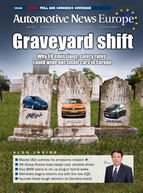STOCKHOLM -- Sweden's ambitious plan to drastically cut emissions from transport by bringing millions of electric cars onto the road could be derailed by a lack of power capacity for new charging stations in major cities.
An increase in government grants sent sales of electric cars surging by 253 percent in the first five months, but the rally could be over before it has really started.
Demand for electricity in Stockholm and other cities is outgrowing capacity in local grids, forcing new charging networks to compete with other projects from housing to subway lines to get hooked up.
To reach a government target of becoming carbon neutral by 2045, the industry group Power Circle says Sweden needs to add about 2.5 million plug-in hybrids and electric vehicles by the end of the next decade. While many of these will be charged at home for shorter journeys, a network of stations for longer trips and professional drivers from taxis to delivery vans is also needed.
"To get people to take the plunge and want to buy an electric car they should not be forced to take long detours to find a charging station," said Tobias Henmark, head of the Swedish unit of Fortum Charge and Drive, which operates 740 fast chargers in the Nordic region. "Right now there is a tendency to cover up the deficiency by increasing the cost of capacity, and that would make it impossible to build a charging infrastructure."
For the rise in electric vehicles to be manageable despite the lack of power capacity, Power Circle suggests that owners should get incentives not to charge and even send power back to the grid during morning and afternoon peak hours. If enough cars in the future are connected and willing to share their batteries with the grid, more electric vehicles would lessen the capacity problem instead of making it worse.
"Electric cars can make or break the grid," said Johanna Lakso, who heads the group. "When we are about to roll out the infrastructure why not be smart about it and use it to support the power networks?"


